5 books about Schwieder, Dorothy
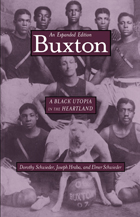
Buxton
A Black Utopia in the Heartland, An Expanded Edition
Dorothy Schwieder
University of Iowa Press, 2003
From 1900 until the early 1920s, an unusual community existed in America's heartland-Buxton, Iowa. Originally established by the Consolidation Coal Company, Buxton was the largest unincorporated coal mining community in Iowa. What made Buxton unique, however, is the fact that the majority of its 5,000 residents were African Americans—a highly unusual racial composition for a state which was over 90 percent white. At a time when both southern and northern blacks were disadvantaged and oppressed, blacks in Buxton enjoyed true racial integration—steady employment, above-average wages, decent housing, and minimal discrimination. For such reasons, Buxton was commonly known as “the black man's utopia in Iowa.”
Containing documentary evidence—including newspapers, census records, photographs, and state mining reports—along with interviews of 75 former residents, Buxton: Work and Racial Equality in a Coal Mining Community (originally published in 1987 and winner of the 1988 Benjamin Shambaugh Award) explored the Buxton experience from a variety of perspectives. The authors—an American historian, a family sociologist, and a race relations sociologist—provided a truly interdisciplinary history of one Iowa's most unique communities.
Now, eighty years after the town's demise and fifteen years after Buxton's original publication, the history of this Iowa town remains a compelling story that continues to capture people's imaginations. In Buxton: A Black Utopia in the Heartland, the authors offer further reflections upon their original study and the many former Buxton residents who shared their memories. In the new essay, “A Buxton Perspective,” issues such as social class and the town's continuing legacy are addressed. The voices captured inBuxton, although recorded over twenty years ago, still resonate with exuberance, affection, and poignancy; this expanded edition will bring their amazing stories back to the forefront of Iowa and American history. [more]
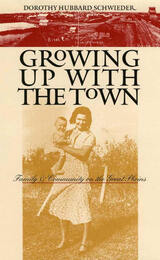
Growing Up with the Town
Family and Community on the Great Plains
Dorothy Hubbard Schwieder
University of Iowa Press, 2002
In this unusual blend of chronological and personal history, Dorothy Hubbard Schwieder combines scholarly sources with family memories to create a loving and informed history of Presho, South Dakota, and her family's life there from the time of settlement in 1905 to the mid 1950s.
Schwieder tells the story of this small town in the West River country, with its harsh and unpredictable physical environment, through the activities of her father, Walter Hubbard, and his family of ten children. Walter Hubbard’s experiences as a business owner and town builder and his attitudes toward work, education, and family both reflected and shaped the lives of Presho's inhabitants and the town itself.
While most histories of the Plains focus on farm life, Schwieder writes entirely about small-town society. She uses newspaper accounts, state and county histories, census data, interviews with residents, and the childhood memories of herself and her nine siblings to create an entwined, first-hand social and economic portrait of life on main street from the perspective of its citizens. [more]
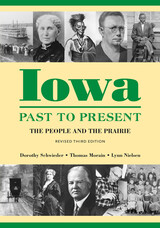
Iowa Past to Present
The People and the Prairie, Revised Third Edition
Dorothy Schwieder
University of Iowa Press, 2011
In Iowa Past to Present, originally published in 1989, Dorothy Schwieder, Thomas Morain, and Lynn Nielsen combine their extensive knowledge of Iowa’s history with years of experience addressing the educational needs of elementary and middle-school students. Their skillful and accessible narrative brings alive the people and events that populate Iowa’s rich heritage. This revised edition brings the story into the twenty-first century and makes a paperback edition available for the first time.
Beginning with Iowa’s changing geological landforms, the authors progress to historical, political, and social aspects of life in Iowa through the present day. The chapters explore such topics as the native peoples of the region; pioneer settlements on the prairie; the building of the railroad; the Civil War; the influence of immigrants; the formation of the state government and development of the current politic system; education; the Great Depression; religion (including a separate chapter on Mennonites and the Old Order Amish); life on the farm; business, industry, and economics; and the turmoil caused by World War I, World War II, and the Vietnam War. A new chapter written specifically for this edition explains the impact of 9/11 on Iowa, discusses the roles played by Iowa soldiers in Iraq and Afghanistan, and updates information on the newest immigrant populations of the state.
The authors have teamed with Iowa Public Television's Iowa Pathways project to create a new Iowa Past to Present teacher's guide available online at <http://iptv.org/iowapathways>. This guide includes additional articles, videos, links, and curriculum resources to support the textbook.
Iowa Past to Present, its inviting format enhanced by hundreds of illustrations, is informed by three of the state’s most respected historians. The latest revision continues to be an important part of the curriculum for teachers and parents wanting their children to know all about Iowa history.
[more]
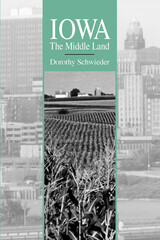
Iowa
The Middle Land
Dorothy Schwieder
University of Iowa Press, 1996
In this engrossing history of the Hawkeye State, Dorothy Schweider reveals a place of fascinating grassroots politics, economic troubles and triumphs, surprising cultural diversity, and unsung natural beauty. Above all, this is the history of the people of Iowa and the lives they have led—the accomplishments of both ordinary and not-so-ordinary Iowans.
[more]
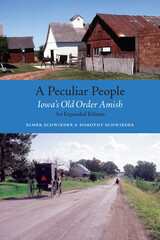
A Peculiar People
Iowa's Old Order Amish
Elmer Schwieder
University of Iowa Press, 1975
Now back in print with a new essay, this classic of Iowa history focuses on the Old Order Amish Mennonites, the state’s most distinctive religious minority. Sociologist Elmer Schwieder and historian Dorothy Schwieder began their research with the largest group of Old Order Amish in the state, the community near Kalona in Johnson and Washington counties, in April 1970; they extended their studies and friendships in later years to other Old Order settlements as well as the slightly less conservative Beachy Amish.
A Peculiar People explores the origin and growth of the Old Order Amish in Iowa, their religious practices, economic organization, family life, the formation of new communities, and the vital issue of education. Included also are appendixes giving the 1967 “Act Relating to Compulsory School Attendance and Educational Standards”; a sample “Church Organization Financial Agreement,” demonstrating the group’s unusual but advantageous mutual financial system; and the 1632 Dortrecht Confession of Faith, whose eighteen articles cover all the basic religious tenets of the Old Order Amish.
Thomas Morain’s new essay describes external and internal issues for the Iowa Amish from the 1970s to today. The growth of utopian Amish communities across the nation, changes in occupation (although The Amish Directory still lists buggy shop operators, wheelwrights, and one lone horse dentist), the current state of education and health care, and the conscious balance between modern and traditional ways are reflected in an essay that describes how the Old Order dedication to Gelassenheit—the yielding of self to the interests of the larger community—has served its members well into the twenty-first century.
A Peculiar People explores the origin and growth of the Old Order Amish in Iowa, their religious practices, economic organization, family life, the formation of new communities, and the vital issue of education. Included also are appendixes giving the 1967 “Act Relating to Compulsory School Attendance and Educational Standards”; a sample “Church Organization Financial Agreement,” demonstrating the group’s unusual but advantageous mutual financial system; and the 1632 Dortrecht Confession of Faith, whose eighteen articles cover all the basic religious tenets of the Old Order Amish.
Thomas Morain’s new essay describes external and internal issues for the Iowa Amish from the 1970s to today. The growth of utopian Amish communities across the nation, changes in occupation (although The Amish Directory still lists buggy shop operators, wheelwrights, and one lone horse dentist), the current state of education and health care, and the conscious balance between modern and traditional ways are reflected in an essay that describes how the Old Order dedication to Gelassenheit—the yielding of self to the interests of the larger community—has served its members well into the twenty-first century.
[more]
READERS
Browse our collection.
PUBLISHERS
See BiblioVault's publisher services.
STUDENT SERVICES
Files for college accessibility offices.
UChicago Accessibility Resources
home | accessibility | search | about | contact us
BiblioVault ® 2001 - 2024
The University of Chicago Press









